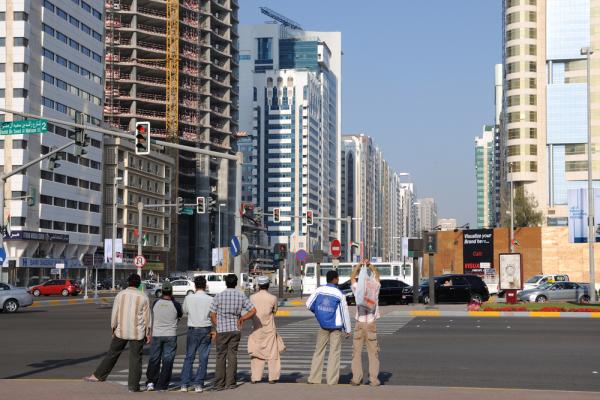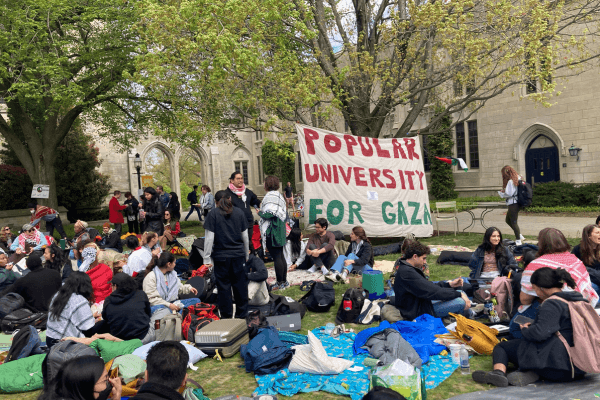Much has been made of the United States’ approach to accepting immigrants from the Middle East. But countries in the Gulf States are very familiar with the challenges and opportunities facing immigrants: The region has some of the highest levels of immigration as a percentage of their population in the world.
For countries like Kuwait and Qatar, which both boast an immigrant population of nearly 75 percent, and many from surrounding Gulf States and the broader Middle East, this is a huge economic opportunity, according to Philippe Fargues, founding director of the Migration Policy Centre and professor at the European University Institute in Fiesole, Italy.
“Not only is Arab emigration twice as high as the world average, but its recent growth and its potential for future growth seem equally high,” he said.
The rapidly-developing United Arab Emirates tops the list for regional immigration — migrants constitute nearly 90 percent of the UAE’s population, owing to the country’s economic attractiveness and public infrastructure.
The UAE’s borders are open to those who seek work. Historically, rights of migrants have been restricted, but for a country so reliant on its immigrant workforce, the system has been evolving in recent years. In 2015, the UAE introduced labor reforms aimed at reducing abuses of migrants. The results are varied.
To work in the UAE, a foreign worker must be sponsored by a national or by a business with Emirati national involvement (as a partner, director, etc), through a sponsorship program called Kafala. Visas are granted temporarily and must be renewed at frequent intervals. If the employment is terminated, the worker has to leave the country.
Interestingly, the word Kafala also refers to the system of adoption of a child. Sharia law in the UAE does not allow for legal adoption, which gives adopted children the same rights as biological children, but allows parents to “sponsor” — or guarantee the welfare of and assume responsibility for — a child.
In the immigration system, Kafala plays out literally. “Once the company gives you a promotion and a pay hike, they also provide you with visas for your family,” Joel Elecho, an immigrant from Uganda, said — visas that may last for one-to-three years, depending on the nature of the work. An immigrant worker may sponsor the residence visa for their spouse and children if they fulfill certain requirements, like a minimum salary, set by the General Directorate of Residency and Foreigners Affairs (GDRFA).
By virtue of UAE’s easy access policies with respect to work visas, immigrant workers are able to earn far more than they would otherwise have earned in their home countries, and are able to remit money earned back to their families.
“The economic benefit to migrant workers is extraordinarily and systematically large: migration to the UAE for basic construction work causes their daily wage to rise by a factor of five, and causes employment to rise by at least 20 percentage points,” wrote Michael Clemens, co-director of migration, displacement, and humanitarian policy and a senior fellow at the Center for Global Development. “…There is no sign that many of the commonly-mentioned costs of migration are systematically experienced by migrants’ households; migration to the Gulf causes the fraction of households in debt to sharply decline.”
A 2016 report from the World Bank revealed that the six Gulf Cooperation Countries, UAE included, accounted for $98 billion in outward foreign remittances in 2014, suggesting UAE’s migration policies provide a step toward bridging global gaps in general standard of living.
But the Kafala system is far from perfect. A barrage of reports in 2014 highlighted the plight of migrant workers in the UAE.
Effectively, this system gives sponsors legal control over workers, according to Migrant-Rights.org:
Without the employer’s permission, workers cannot change jobs, quit jobs, or leave the country. If a worker leaves a job without permission, the employer has the power to cancel his or her residence visa, automatically turning the worker into an illegal resident in the country. Workers whose employers cancel their residency visas often have to leave the country through deportation proceedings, and many have to spend time behind bars.
The process of acceptance or rejection of visas therefore depends solely on the employer who will be sponsoring the immigrant worker.
“Sometimes the companies have too much power,” Elecho said.
In response to this scrutiny, the UAE has relaxed visa regulations in recent years. And to overcome structural divisions in the labor market, the UAE’s government launched an Emiratisation campaign in 2012.
“Emiratisation” aims to increase the number of locals in the job market and their contribution to the economy by giving them “stable and fulfilling” career opportunities. Private sector companies like Injazat and Abu Dhabi Islamic Bank have also partnered with government programs to improve employment opportunities for UAE nationals.
Creating employment opportunities for legal and local populations has gone a long way in ensuring low unemployment rates and broader economic growth, and calming anti-immigrant sentiments. In part this is thanks to the language of the government's initiative Vision 2021, which recognises the importance of a "cohesive society and preserved identity." The government appears committed to promoting an inclusive environment, one that integrates all segments of society while preserving UAE’s unique culture, heritage, and traditions.
“It’s amazing,” Giulia Senigaglia, education coordinator at the Sheik Muhammed Centre for Cultural Understanding, said.
“My kids are here. If you ask them, ‘Where are you from,’ they say, ‘I’m from Dubai but my father is from Egypt and my mom is from America.’ So, they have a feeling of being from here and at the same time they are keeping their roots.”
The UAE is simultaneously working to curb undocumented immigration. In December 2012, the government announced a two-month amnesty program allowing unauthorized migrant workers to regularize their situations or leave the country without punishment.
Nearly 20,400 migrants had applied for amnesty by January 2013, according to the Migration Policy Institute.
“Unlike yester-years, immigrants can now obtain property… get a flat or a house on a 90-year lease, build a business, sponsor family members, and not be bound to anyone,” Manohar Pinto, an Indian who worked in the UAE for 25 years, said.
“But, if a migrant worker wants to leave his current job for a better prospect, his ability to do so is still dependent on his current sponsor.”
Got something to say about what you're reading? We value your feedback!







